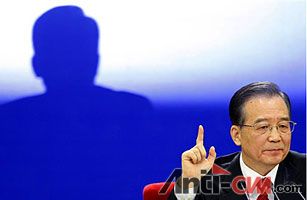|
China Takes Aim at the U.S. on Currency Conflict
http://www.time.com/time/world/article/0,8599,1971959,00.html

Chinese Premier Wen Jiabao, during a news conference following the closing session of the National People's Congress in Beijing on March 14, 2010 。Jason Lee / Reuters
At one moment during Chinese Prime Minister Wen Jiabao's press conference on Sunday, it was easy to confuse whom he was criticizing when he denounced efforts by some countries to lower the value of their currency to boost trade.
"What I do not understand is the practice of depreciating one's own currency and attempting to pressure other countries to appreciate theirs for the purpose of increasing exports," he told reporters during a nationally televised event that wrapped up the annual session of China's parliament. "In my view, that is a kind of trade protectionism." (See pictures of the making of modern China.)
Wen was presumably referring to the U.S.: President Obama declared in a speech last week that he wanted to double U.S. exports over the next five years and challenged China to adopt a "market-oriented exchange rate" for its currency, the renminbi. But the policies that Wen was criticizing are in many respects what China has pursued for years. The renminbi has been pegged against the dollar since mid-2008, and overseas economists say the currency may be undervalued by as much as 40%. Trade is a key component of economic growth for China, the world's largest exporter, and the government is wary of any sort of collapse that could contribute to unemployment. Efforts to boost exports, including the currency peg, helped Chinese manufacturers weather the worst of the global downturn last year and grab more market share from some competitors. Last month, Chinese exports grew 45.7% over February 2009, up from a 21% increase for January.
Wen's comments follow a period of deteriorating Sino-U.S. relations that began late last year, when he was accused of snubbing Obama during the Copenhagen climate talks. On Sunday, Wen said he had been slighted first when he wasn't invited to a meeting of national leaders during the conference in Denmark. He responded by sending a deputy official, which prompted criticism from some delegations.
Relations between the two powers came under strain again in January after Obama approved a $6.4 billion arms package to Taiwan, the self-ruled island that China considers part of its territory. A month later, Obama met the Dalai Lama at the White House, further angering the Chinese, who consider the exiled Tibetan spiritual leader to be a "splittist" who advocates independence for Tibet. Wen blamed the U.S. for the recent difficulties, specifically citing the Taiwan arms sale and the Dalai Lama meeting. "The responsibility for the serious disruption in U.S.-China ties does not lie with the Chinese side but with the U.S.," he said.
Taiwan and Tibet have long been points of dispute between the U.S. and China. During 2009 they were largely avoided, as Obama delayed final approval of the arms sale, which was initially greenlighted by his predecessor, George W. Bush, and postponed the Dalai Lama meeting to avoid offending Beijing ahead of his first state visit to China. Following this year's arms-sale announcement, however, China cut off high-level military exchanges with the U.S., which had been recently restored following China's protest over a previous weapons package that was approved by Bush in 2008.
Broaching two sensitive issues in such a short time period would inevitably weaken ties, but other issues have contributed. After U.S. Internet giant Google threatened to pull out of China in January, citing Chinese censorship and sophisticated hacking attacks on its infrastructure, U.S. Secretary of State Hillary Clinton cited China in a speech in support of online freedom. China and Google have held talks recently, and the Financial Times reported on Saturday that the company was "99.9 %" certain to close its google.cn site, which is aimed at Chinese users and censors search returns according to Chinese regulations.
But trade looms even larger as a source of tension between the two sides. Last year, China's economy expanded at a robust 8.7% despite the global downturn. As the U.S. and other nations struggle to resume growth and reduce high unemployment, they are eyeing China's performance with both envy and agitation. In April, the U.S. Treasury Department will be required by law to declare whether China manipulates its currency — an announcement that could fuel calls in Congress for retaliatory measures against the nation.
In his speech on Sunday, Wen shot down expectations that China would allow the value of the renminbi to appreciate significantly, saying it was correctly valued and would remain "basically stable at a reasonable level" this year. "We oppose nations finger-pointing or even using forceful methods to compel a country to raise the value of its currency," he said. He also worried openly about the value of China's dollar-denominated assets, including $895 billion in U.S. Treasury debt. He warned the U.S. not to depreciate its currency to boost trade, as it would hurt the value of Chinese-held assets. The U.S. depends on China's Treasury purchases to fund its budget deficit, which is forecast to exceed $1.5 trillion this year. Still, U.S. lawmakers are unlikely to give much credence to Wen's statement that he doesn't understand how a country could devalue its currency to boost trade. It is, after all,China's own policy.

|